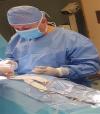What Is First-line Treatment Option Pre-diabetes And High Blood Pressure?

Question: Hi,
I have previously asked about my wife who has right orbit inflammation as seen on the MRI scans. I have attached the MRI report.
At this stage the cause is still unknown. Should the condition be idiopathic I understand that the main treatment consists of steroid administration. However, I have read that other treatments such as steroid-sparing treatments such as Cyclosporin-A, rituximab. Or biological agents might be used.
Given existing pre-diabetes and high blood pressure, should these other treatments be considered seriously as a first-line treatment option? What are generally the advantages or disadvantages compared to use of steroids?
Thank you,
Regards.
I have previously asked about my wife who has right orbit inflammation as seen on the MRI scans. I have attached the MRI report.
At this stage the cause is still unknown. Should the condition be idiopathic I understand that the main treatment consists of steroid administration. However, I have read that other treatments such as steroid-sparing treatments such as Cyclosporin-A, rituximab. Or biological agents might be used.
Given existing pre-diabetes and high blood pressure, should these other treatments be considered seriously as a first-line treatment option? What are generally the advantages or disadvantages compared to use of steroids?
Thank you,
Regards.
Brief Answer:
I would explain as follows.
Detailed Answer:
Hello,
I have read your question about the dilemma of treating an idiopathic condition with steroids or cytostatic.
These two different groups of drugs are somewhat similar when it comes to disadvantages and adverse effects.
While the steroids modulate the inflammation, cytostatic drugs suppress the proliferation of the cells including normal ones.
In my opinion, low doses of steroids for a limited time should be tried as the first line.
Cytostatics should be considered if steroids fail to improve the condition.
I hope you found the answer helpful.
Let me know if I can assist you further.
Thanks.
I would explain as follows.
Detailed Answer:
Hello,
I have read your question about the dilemma of treating an idiopathic condition with steroids or cytostatic.
These two different groups of drugs are somewhat similar when it comes to disadvantages and adverse effects.
While the steroids modulate the inflammation, cytostatic drugs suppress the proliferation of the cells including normal ones.
In my opinion, low doses of steroids for a limited time should be tried as the first line.
Cytostatics should be considered if steroids fail to improve the condition.
I hope you found the answer helpful.
Let me know if I can assist you further.
Thanks.
Above answer was peer-reviewed by :
Dr. Vaishalee Punj


Dear Dr. Spaho,
Thank you for the follow up and information and advice.
I understand that low-dose steroids could be the first-line treatment.
I have attached the report from the neurologist. I am still not sure that in case the condition is idiopathic, if it does return after steroid treatment or affects other areas would the further treatment usually just consist of further steroids or would other second-line treatments be considered at that point?
Thank you.
Thank you for the follow up and information and advice.
I understand that low-dose steroids could be the first-line treatment.
I have attached the report from the neurologist. I am still not sure that in case the condition is idiopathic, if it does return after steroid treatment or affects other areas would the further treatment usually just consist of further steroids or would other second-line treatments be considered at that point?
Thank you.
Brief Answer:
I would explain as follows.
Detailed Answer:
Hello again.
I have read your follow-up question.
If the steroids fail to improve the condition, cytostatic drugs should be considered for further treatment.
I hope this helps.
Feel free to ask if You have further questions.
Take care.
I would explain as follows.
Detailed Answer:
Hello again.
I have read your follow-up question.
If the steroids fail to improve the condition, cytostatic drugs should be considered for further treatment.
I hope this helps.
Feel free to ask if You have further questions.
Take care.
Above answer was peer-reviewed by :
Dr. Dr.Raju.A.T


Dear Dr. Spaho,
Thank you for your reply and information.
We have just received blood test results with a diagnosis of diabetes based on the oral glucose tolerance test. I have attached the results below. The fasting blood sugar levels look to be ok.
Can diabetes contribute to or be related to the condition of right orbital apex inflammation?
Thank you.
GTT(p),T Ins(s) - 16/09/2024
NO HISTORY
Glucose Tolerance Test with Insulins
Glucose load 75 g
Plasma Glucose Insulin
Fasting 4.9 mmol/L ( 3.6 - 6.0 ) 6 mU/L
1 Hour 10.2 mmol/L 28 mU/L
2 Hours H 12.7 mmol/L ( 3.6 - 7.7 ) 127 mU/L
Thank you for your reply and information.
We have just received blood test results with a diagnosis of diabetes based on the oral glucose tolerance test. I have attached the results below. The fasting blood sugar levels look to be ok.
Can diabetes contribute to or be related to the condition of right orbital apex inflammation?
Thank you.
GTT(p),T Ins(s) - 16/09/2024
NO HISTORY
Glucose Tolerance Test with Insulins
Glucose load 75 g
Plasma Glucose Insulin
Fasting 4.9 mmol/L ( 3.6 - 6.0 ) 6 mU/L
1 Hour 10.2 mmol/L 28 mU/L
2 Hours H 12.7 mmol/L ( 3.6 - 7.7 ) 127 mU/L
Brief Answer:
I would explain as follows.
Detailed Answer:
Hello again.
I have read your follow-up question.
Diabetes can increase the risk of infection, but generally after long periods of untreated and high blood glucose levels.
It is not a condition to be linked specifically with orbital inflammation.
I hope this helps.
Take care.
I would explain as follows.
Detailed Answer:
Hello again.
I have read your follow-up question.
Diabetes can increase the risk of infection, but generally after long periods of untreated and high blood glucose levels.
It is not a condition to be linked specifically with orbital inflammation.
I hope this helps.
Take care.
Above answer was peer-reviewed by :
Dr. Vaishalee Punj


Dear Dr. Spaho,
Thank you for the advice. I understand that diabetes is unlikely to be linked to the condition unless it is very serious in which case it can increase the risks of infection.
Regarding the condition I am unsure of the emphasis on getting a tissue biopsy. It appears that a large or majority subset of the condition is classified as being idiopathic. I am wondering if the logic behind getting a tissue biopsy is to be more certain of a diagnosis and to be more confidently classify the condition as being idiopathic inflammation. In any case it seems like a trial of steroids would be the treatment should the condition be idiopathic.
Would be interested to hear if this is the likely or possible line of thinking.
Thank you.
Thank you for the advice. I understand that diabetes is unlikely to be linked to the condition unless it is very serious in which case it can increase the risks of infection.
Regarding the condition I am unsure of the emphasis on getting a tissue biopsy. It appears that a large or majority subset of the condition is classified as being idiopathic. I am wondering if the logic behind getting a tissue biopsy is to be more certain of a diagnosis and to be more confidently classify the condition as being idiopathic inflammation. In any case it seems like a trial of steroids would be the treatment should the condition be idiopathic.
Would be interested to hear if this is the likely or possible line of thinking.
Thank you.
Brief Answer:
I would explain as follows.
Detailed Answer:
Hello again.
I have read your follow-up question.
The biopsy could give the correct diagnosis.
Regarding the treatment with steroids, is the main treatment possibility.
I hope this helps.
Take care.
I would explain as follows.
Detailed Answer:
Hello again.
I have read your follow-up question.
The biopsy could give the correct diagnosis.
Regarding the treatment with steroids, is the main treatment possibility.
I hope this helps.
Take care.
Above answer was peer-reviewed by :
Dr. Dr.Raju.A.T

Answered by

Get personalised answers from verified doctor in minutes across 80+ specialties



